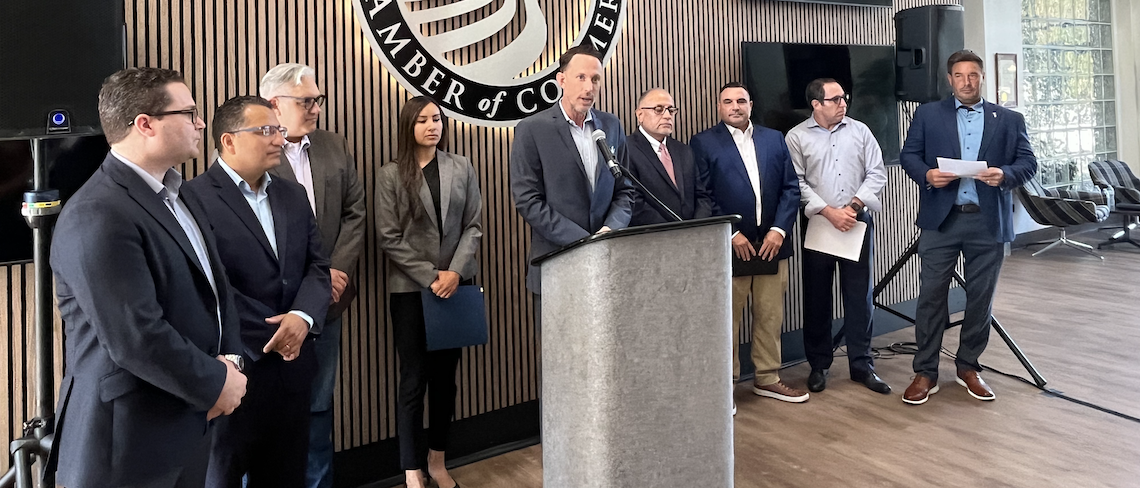
Clint Olivier with Biz Fed Central Valley speaks Tuesday about AB 98. Photo by Frank Lopez
Written by Frank Lopez
Local business and civic leaders are calling for Gov. Gavin Newsom to veto a bill they say would bring more regulation to warehouses and truck routes in the state.
The Fresno Chamber of Commerce hosted a news conference Tuesday to ask the governor to veto Assembly Bill 98, which would mandate buffer zones between new logistics warehouse developments and residential areas, and restrict truck routes to and from such facilities.
Elected officials and business leaders present at the press event were Fresno City Council President Annalisa Perea; League of California Cities President Daniel Parra; Fresno Chamber CEO Scott Miller; Newmark Person Commercial Senior Vice President Nick Audino; Precision Civil Engineering President Ed Dunkel; Biz Fed Central Valley President and CEO Clint Olivier; Ethan Smith of INVEST Fresno; and Will Oliver, Fresno County Economic Development Corp. CEO.
Olivier said AB 98, authored by Juan Carrillo (D-Palmdale) and Eloise Gomez Reyes (D-San Bernardino), sets a “dangerous precedent” that would stunt economic growth in the region.
“We believe this could have some very detrimental effects on business, not just statewide, but especially here in the Valley where we are still dealing with various, highly concentrated poverty, and we want to get people to work,” Olivier said.
According to the bill text, after Jan. 1, 2026, any new or expanded logistics warehouse development of 250,000 square feet or more can’t be located within 900 feet of a “sensitive receptor.” Development in an industrial zone will have new standards.
Sensitive receptors include private residences, schools, daycare facilities, public owned parks and playgrounds, nursing homes and hospitals.
Projects that have a loading bay within 900 feet of a sensitive receptor would see the new standards effective Sept. 30 of this year.
The new standards include the submission of a truck routing plan, truck route signage, anti-idling signage, the placement of entry gates, and a 2-1 housing replacement commitment if dwelling units are to be demolished.
Other new standards include maintaining buffering and screening distances for sensitive receptors, and different solar power requirements depending on the size of a facility.
Chamber CEO Miller said AB 98 imposes a threat to logistics businesses that are grappling with rising costs, increased regulation and a competitive labor market.
“If this bill passes it will place even more pressure on these businesses, limiting their ability to grow, hire more workers, and to continue contributing to the economy of the region,” he said.
According to an Economic Impact Fact Sheet from Invest Fresno, the industry sector brings over $13 billion in economic activity and accounts for 35% of the city’s total economic output.
Miller said they are urging Gov. Newsom to veto AB 98 for the sake of Fresno’s business community and for the families that depend on those jobs.
Perea said that the city and business community are committed to protecting vulnerable communities, while at the same time working to help businesses grow, increase job opportunities, and expand the revenue base.
Dunkel said he believes the bill has good intentions, but there could still be some bad consequences, and from a business owner’s perspective, he sees the negative impacts.
He said the bill would not only effect logistics facilities, but ancillary industries in the construction and design sector as well.
“We can do this right, where we need to sit-down and talk amongst ourselves and come up with a solution that makes sense for everyone and helps everyone throughout the economy and state,” Dunkel said.
Author Gomez Reyes of San Bernardino told CalMatters the bill would counter the environmental and health effects of explosive warehouse growth in the Inland Empire, where 4,000 warehouses occupy a billion square feet combined and generate more than 600,000 truck trips per day.
“We have tried to do as best we can, remembering that it’s the health of the residents of California that has to be the state’s top priority,” she told CalMatters. “Everything else is secondary.”








